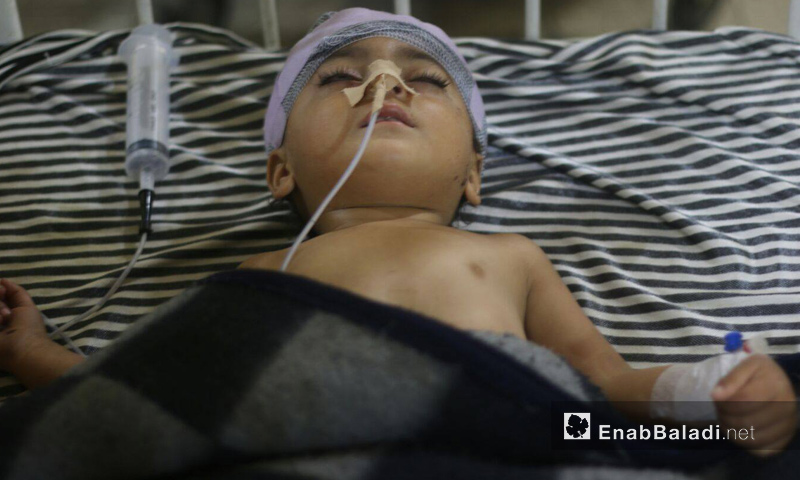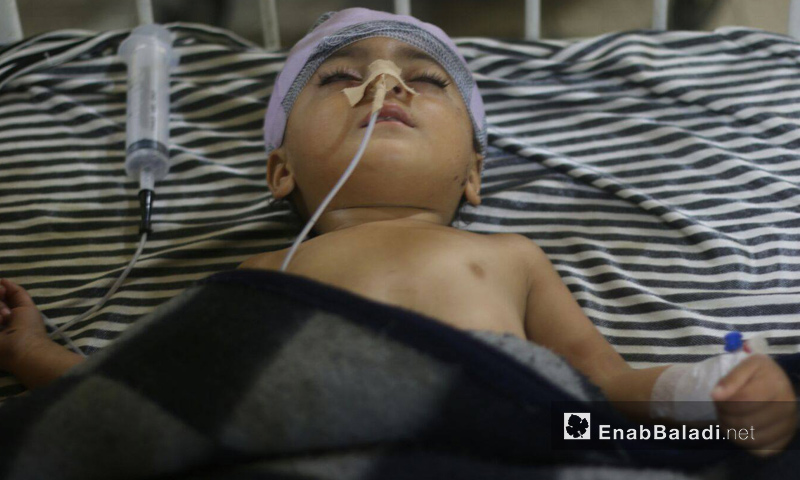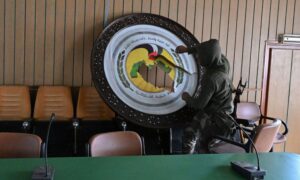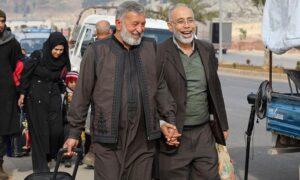The resident of the besieged city of Douma in the eastern Ghouta, Ali Beswani, spoke about his long suffering in securing the vaccine for his son, with glimpses of happiness and joy after he completed the vaccine program for his three-year-old son and thus avoided dangerous diseases.
Beswani talked about the suffering and the difficulties he faced during the search for the vaccine and its insurance to his child, which included delay in giving the vaccine until five months after birth, while part of it should be given two months after birth. This is in addition to the long waiting periods which extended to three days in front of the vaccine centre due to congestion, amid fears of the Syrian regime bombing. He said: “It was terrifying to put my life and the life of the child at risk because of the fear of bombing the gathering place, which was overcrowded with hundreds of civilians who were waiting for their turn to take the vaccine.”
Furthermore, Samir Barhoum, who expressed his fear that his child’s situation would aggravate again, said: “My nine-year-old child, who has been infected with tonsillar tuberculosis that appeared on his neck more than a year ago, and I am afraid that his situation will worsen again as a result of his incomplete doses of the vaccine.”
The two children, Dooha (two years old) and Rahaf (five years old), were taken to the intensive care unit in the city of Douma last May, according to the medical office in the city, because they had measles. The disease became more severe after the two children had fever, which necessitated receiving them in the intensive care unit in the specialist hospital of Damascus countryside.
Suffering and disease are not the only problems in the towns and villages of Eastern Ghouta, which have been besieged by the Syrian regime for years, but suffering spread among the majority of people in the region who are eager to hear the news of the entry of vaccine trucks to begin the journey of waiting and fear in order to protect their children from diseases.
In this report, Enab Baladi tries to raise the awareness of the people of the Eastern Ghouta about the importance of the types of vaccines that can be available in the region, and to identify the places that provide vaccines as well as how to communicate with the concerned people in order to have an idea about the availability of the vaccine, the symptoms of diseases and how to prevent them. This is in addition to highlighting the major diseases that have spread significantly, particularly “polio, measles and tuberculosis,” through talking with specialized doctors.
Wars are fertile ground for epidemics
Children vaccination is an effective means of protecting against some of the most serious diseases that are nearly extinct thanks to its effectiveness, especially poliomyelitis, which has decreased by 99% since 1988, according to the September 2016 World Health Organization report. In order to insure continued protection against these diseases and reduce their return, it is necessary to take appropriate vaccines, especially for newborns, because of their weak immune system.
The vaccine, though important in normal circumstances, is becoming increasingly important in case of wars and siege, said Dr. Akram Kholani, a specialist in family medicine. He confirmed to Enab Baladi that a large number of the diseases increased during wars and siege, as a result of the poor health care system and its collapse. Moreover, most diseases are associated with cases of malnutrition, which occur very frequently in places exposed to blockade, such as the Eastern Ghouta, where the role of the vaccine in reducing these diseases becomes very important.
Dr. Kholani stressed that the importance of the vaccine lies in giving it before the child is infected with the disease, because it is useless after being infected with the three diseases: poliomyelitis, measles and tuberculosis.
Dr. Mohammed Bakkar, former member of the central vaccine team in Eastern Ghouta, said that the vaccine is an important issue in health and couldn’t be ignored. Pandemic diseases are transboundary and they pass barriers. They do not stop at the front lines of the war, such as polio that threatens neighbouring countries and the world.
According to Bakkar, vaccines are important because of the spread of epidemics in the areas of war and siege, where famine is widespread, in addition to the low level of health culture and hygiene as well as the spread of contaminated water. He pointed out that health education is important, but does not prevent these epidemics from spreading as it just limits them.
How do parents communicate with those responsible for vaccine?
The entry of the vaccine into the eastern areas of Ghouta is supposed to be done through the Ministry of Health in the Syrian Interim Government as the area is under the control of the opposition, confirmed Hassan Mohammed the official in Ghouta. But the siege imposed by the regime since years and the inability of the Interim Government to reach the area left one possibility which is the Syrian Red Crescent.
According to Mohammed, the entry of the vaccine has been irregular. He stated that “in 2012 and 2013, the vaccine was never introduced, but by the beginning of 2014 doses were introduced once or twice a year. However, vaccines are now entering every two months, and this would lead to children escaping the vaccine, in addition to the irregularity of the doses of vaccine given to them. The vaccine follows a national program and this means that the doses must be taken in a specific period of time.”
“I’ve been waiting for five months to vaccinate my child after his birth, even though he was supposed to take it a month and a half after the birth. However, the vaccine was not available, so I had to wait,” said Beswani. The father stressed that the introduced vaccines were irregular, repetitive and not consistent with the age of the child and his needs.
Enab Baladi communicated with the Red Crescent to learn more about the times and places of the vaccine entry in order to provide parents with guidance and instructions.
The Red Crescent official, Hassan Mohammed, stated that after the vaccine entered the eastern cities of Ghouta, it was distributed to the centres deployed there according to the number of families in the region. Each town has a health care centre which the Red Crescent considers as a vaccine centre.
According to Mohamed, there are 22 centres in Ghouta, five of which are directly supervised by the Red Crescent, while the remaining 17 others are only supervised organizationally by the Red Crescent, as it is responsible for maintaining cooling, organization and hygiene, in addition to the presence of a pediatrician.
Baqqar confirmed that the vaccines are distributed to the centres in Ghouta as soon as they arrive. That is when heads and members of each centre meet to plan the vaccination process, inform citizens of its availability and start organizing the operation.
He pointed out that in each city there are two or a single centre affiliated to the Crescent and responsible for giving vaccines. There is one centre in Madira city and in Harasta, and there is no town left without a center. Large cities such as Douma include five centres.
After the introduction of the vaccine, awareness campaigns start telling the news to people through various means, the most important of which is the publication of advertising campaigns on social media, especially Facebook, according to Mohammed.
The Syrian Red Crescent page is at the forefront (https://www.facebook.com/SYRedCrescent), since it is the primary responsible for the introduction of the vaccine into Ghouta. The Facebook page of the Unified Medical Office in Eastern Ghouta is the following (https://www.facebook.com/Unified.Medical.Bureau.in.East.Gouta), the Syrian Arab Red Crescent Douma Division is (https://www.facebook.com/Sarc.Douma) and the Syrian Arab Red Crescent and Harasta Division’s Facebook page is (https://www.facebook.com//218825414901730)
According to Mohammed, parents have to communicate with the Red Crescent, the main centre, in order to know whether the vaccine is available there or not, through visiting its Facebook page, calling number +963 11 332 7691 or contacting the Unified Medical Office in Eastern Ghouta through Facebook or the following phone number +963 992 977 198. It is also possible to contact the Health Directorate of Damascus and its suburbs that is affiliated to the Syrian Interim Government’s Ministry of Health via email [email protected], which is found on its Facebook page, in addition to contacting the medical center located in their province, the local council or the mosque located in the area.
“After the entry of the vaccine, its availability in the Crescent centres was announced through mosques and the available media within the besieged areas, particularly the pages on social network sites,” according to Beswani.
Three spreading diseases must be prevented
In the eastern region of Ghouta, certain types of diseases, which had nearly disappeared tens of years ago, have appeared in recent years. Enab Baladi tried to monitor the most important and most dangerous ones, specifically polio, measles and tuberculosis.
Before talking about the most prevalent diseases in the region, it is crucial to note the importance of prevention in the absence of a vaccine. However, prevention is not an alternative for vaccine, according to Doctor Amer Ibrahim. He told Enab Baladi that “unfortunately there is no alternative to the vaccine but prevention through cleaning and well-washing can protect from those diseases.”
Polio
Dr. Akram Khulani explained that polio is a viral infection, and about 99% of the infected cases show the same symptoms of any viral infection, such as “cold or flu.” It is characterized by fever, fatigue, pain in the month and articulations, exhaustion and headache. He indicated that during ten days these symptoms are not noticeable, and sometimes parents do not think that the child in infected with polio, but rather is a cold.
Khulani explained that some of the infections develop into a neurological infection. After ten days of viral infection, neurological symptoms appear, such as relaxation in the lower limbs, and the child cannot stand on his feet. Then, situation develops and one side becomes totally paralyzed while the other remains partially. That is when the parents will recognize that their child is infected with polio.
The virus is transmitted from one person to another through several ways, including direct contact between an infected person and another healthy person, through mucus and phlegm from the mouth and nose, and through contaminated feces, as well as contaminated food and water. The virus enters the body through the mouth or nose and proliferates in the throat and intestines. It is then absorbed into the body and transmitted through the blood to the rest of the body parts.
The doctor stressed that prevention primarily requires the vaccine, but in case of absence of this vaccine it is advised to stay away from a person who is suspected of carrying the polio virus, in addition to taking care of general health, washing foods well and not drinking contaminated water.
The doctor noted that after discovering the paralysis there would be no cure, but it is recommended to take some measures to reduce the associated complications. These measures include the need to rest in bed, taking painkillers, such as ibuprofen and paracetamol, and antibiotics for secondary infections. For example: for urinary tract, it is advised to take Ceftriaxone and Cefixime, for intestinal inflammation it is advised to take Cefixime or Bactrim, for inflammation of respiratory organs, it is advised to take Ceftriaxone and Cefixime (taking into account that taking the medicine should be based on the consultation of the doctor to avoid complications of medicines and the allergies that might be caused by the nature of each body). In addition, it is advised to undergo natural physical therapy sessions to prevent distortion and the loss of the muscle’s function.
Measles
It is a highly contagious viral disease. Its virus affects the respiratory mucosa and then moves to the rest of the body. There are two types of this disease. The first is called measles, which is the dangerous type, as it is one of the main diseases that cause the death of children under the age of five. The second type is German measles (Rubella) or what the Syrians call “Humayrah,” but it is not dangerous.
Measles, like other viral diseases, starts with fever and headache, but what distinguishes it are the respiratory infections that afflict the patient for the first three days, such as coughing, redness of the nose and cold. It is the phase when the disease cannot be diagnosed, as neither the doctor nor parents can suspect that the child is infected, according to Dr. Akram Khulani.
However, after three days, white spots that look like salt grains appear on a red base in the oral cavity called Koplik Spots which are descriptive signs of measles. If they appear, the person is known to have measles.
However, these spots appear only for one day, and cannot be detected by the doctor and the parents.
The fever continues to increase during the fourth and fifth days, and can reach 40 °C. Then, the rash begins to appear on the forehead, ears, face and trunk, before finally reaching the arms and the legs.
Khulani stressed that the main prevention is to give the vaccine in the form of three doses; the first at the age of nine months, then at the age of one year and finally at the age of one year and a half.
The disease is transmitted by respiratory secretions or the spray that comes out with coughs, phlegm, or nasal discharge.
The prevention lies in avoiding any contact with any infected person with respiratory infection, even if he does not show the symptoms of the disease (rash), and avoiding touching the belongings of the infected person, such as his cup or spoon, according to Khulani. The infected person who has respiratory infection should use napkins during coughing and wipe his nose.
Khulani reiterated that after the appearance of the disease, the vaccine becomes useless, and treatment would be casual, such as resting in bed and drinking the aforementioned painkillers. But if there is itching, the infected person should be given Antihistamine, and if there are complications such as the inflammation of the middle ear or pharynx, the infected person should be given Augmentin syrup or Amoxicillin. In case of bronchitis, the infected person should be given Ceftriaxone or Clarithromycin. It is important to consult the doctor before taking the medicines.
It is also recommended to give the infected person vitamin A. Khulani explained that studies have shown a lack of this vitamin when children are infected with measles. Thus, giving them the vitamin helps them to recover from measles faster and also reduces the impact of measles on the retina and the eye.
Tuberculosis
Tuberculosis, known also as TB, can be latent, which is not contagious, or active. The active TB is the common form (active pulmonary tuberculosis) that affects the respiratory system, and sometimes the rest of the body, such as the urinary system, bones, intestines and lymph nodes. Its symptoms are general, such as fever, sweating at night, lack of appetite and severe weight loss.
As for the pulmonary infection, it shows the same symptoms, but they are accompanied by respiratory symptoms, especially cough, which is repeated and continuous, then intensifies and becomes accompanied with shortness of breath and blood.
BCG vaccine is given during the first three months after the birth, but in the absence of the vaccine prevention is recommended. It is necessary to avoid infected people and leave a space between the sane and the infected, because the virus is transmitted through air and sneezing. It is necessary to adhere to hygiene procedures, such as good ventilation, covering the mouth and nose during cough and sneezing, especially the infected people.
The best way to prevent tuberculosis from infecting children is to treat adults who mix up with them, as adult patients are the first source of infection for children.
Isoniazid can be used to treat latent TB for nine months, while effective TB treatment requires more than one drug (usually 4 drugs) for six to nine months. The drugs used are Isoniazid, Rifampin, Pyrazinamide, Ethambutol or Streptomycin. After three weeks of regular treatment, the patient will feel better and becomes uninfected.
if you think the article contain wrong information or you have additional details Send Correction
النسخة العربية من المقال
-
Follow us :


















 A
A
A
A
A
A








 More In-Depth
More In-Depth